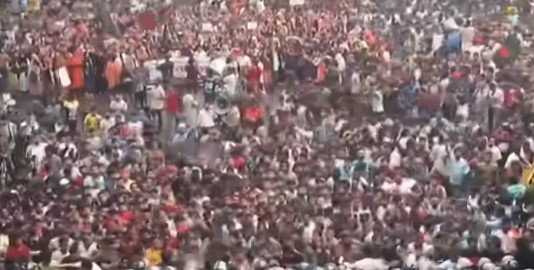Newsman: A telecommunications blackout cut Bangladesh off from the rest of the world on Friday. Internet and mobile services were cut off Thursday after days of deadly clashes over University students across Bangladesh. The websites of major news organizations remain offline.
And several official websites in Bangladesh appeared to be hacked by a group which goes by “THE R3SISTANC3”.
The hacked websites include those of the central bank, the prime minister’s office and police.
On the website of the Prime Minister’s Office, the message reads “Stop Killing Students”, and then, in blood-red capital letters: “It’s not a protest anymore. It’s a war now. “Details of the alleged hackers are not known.
Overall 25 people were killed since Monday, according to a local media report following six deaths earlier this week. Hundreds more have been injured. The violence erupted at the Dhaka University in the capital. Violence pitting protesters against pro-government student groups and police soon spread to other cities.
The violence has continued despite a pending court decision on the legality of quota system.
Prime Minister Hasina and Law Minister Anisul Huq urged protesters to await that decision.
The Prime Minister Hasina said she believes the protesters won’t be disappointed by the court verdict.
“Some precious lives have been lost unnecessarily,” she said. “I condemn every killing” She said. She has also announced a judicial probe to investigate the killings that have taken place
Law Minister Huq said on Thursday that he would be willing to sit with protesters to discuss their demands.
Police and security officials fired bullets and tear gas at protesters in Bangladesh on Friday,
The protests escalated sharply on Monday as fresh violence intensifying the protests and clashes between students and security forces.The government has banned public rallies in capital Dhaka, where buildings were torched amid the clashes on Thursday.
On Wednesday, Prime Minister Sheikh Hasina called for patience and urged the students to wait for the Supreme Court’s decision. The same day, the PM also announced a judicial probe to investigate the killings that have taken place. However the government was seeking an early hearing in the wake of feafly protest across the country.
The Students are calling for the country’s conventional job quota system to be reformed. They argue the system is discriminatory and the reserved jobs for freedom fighters benefit a small group of people, affiliated with Hasina’s Awami League, which led the movement for independence from Pakistan. Under the system, more than half of much sought-after government jobs are reserved. The government has also appealed the High Court decision in the wake of the protests, according to the attorney general’s office.
The Supreme Court then suspended the High Court’s ruling and said it would rule on the quotes by Aug. 7.
The Law Minister Anisul Huq said the government was seeking an early hearing.
“I have already asked the attorney general to appeal in the Supreme Court on Sunday seeking early hearing,” he told reporters. Friday and Saturday form the weekend in Bangladesh. The court opens on Sunday.
Following the first deaths in this week’s violence on Tuesday, the government asked universities across the country to close in hopes of quelling the student unrest, and police raided the main opposition party’s headquarters.
Protesters responded Wednesday evening by saying they would enforce a “complete shutdown” of transportation across the country apart from emergency services on Thursday. The opposition Bangladesh Nationalist Party said that it would join those efforts.
The police released a statement accusing protesters of burning and vandalising buildings, including police and government offices. This included the Dhaka headquarters of state broadcaster Bangladesh Television (BTW), which remains offline since.
Prime Minister Hasina’s government had earlier halted the job quotas following mass student protests in 2018, but on June 5th Bangladesh’s High Court nullified that decision and reinstated the quotas after relatives of the 1971 veterans filed petitions, triggering the latest demonstrations.
On July 14, Hasina had implied that the protesters were “Razakars“, an offensive term for those who collaborated with Pakistan during the 1971 war. That comparison further drew the ire of protesters.
The new clashes follow the bloodiest protests to date, with local media reporting 22 people killed as protesting students attempted to impose a “complete shutdown” on the country. The chaos has highlighted cracks in Bangladesh’s governance and economy and the frustration of young graduates who face a lack of good jobs
On Friday morning, internet services and mobile data appeared to be down in the capital, Dhaka, and social media platforms like Facebook and WhatsApp were not loading.
A statement from the country’s Telecommunication Regulatory Commission said they were unable to ensure service after their data center was attacked Thursday by demonstrators, who set fire to some equipment.
Student protesters said they will extend their calls to impose a shutdown on Friday as well, and urged mosques across the country to hold funeral prayers for those who have been killed.
The main opposition Bangladesh Nationalist Party has backed the protesting students and is expected to hold demonstrations to show their support. Bnagladesh Awami league the current party in power y has accused them of stoking the violence, raiding the BNP’s headquarters and arresting activists from the party’s student wing earlier this week.

